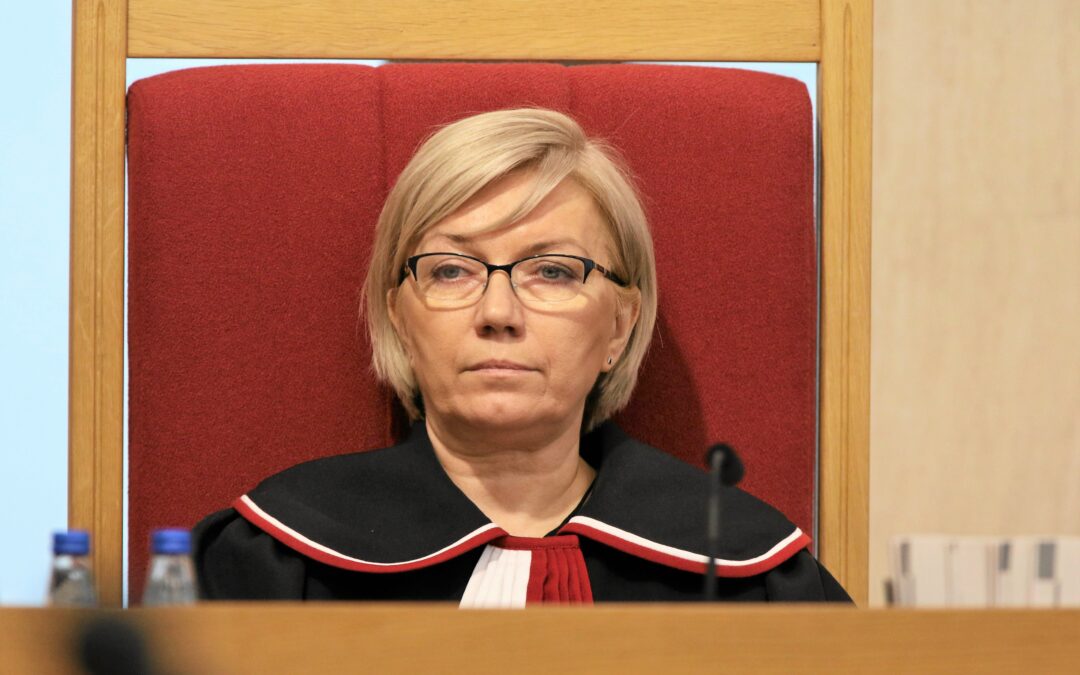Poland’s Constitutional Tribunal (TK) has become embroiled in an internal dispute, after six of its judges – representing 40% of the court’s 15 members – called on the chief justice, Julia Przyłębska, to step down.
They claim – as do many legal experts – that Przyłębska’s term as president of the court expired last month and that a replacement must now be found. Przyłębska, however, denies this and has received support from the government, which believes her term lasts until 2024.
News of the rebellion against Przyłębska was first reported yesterday evening by Rzeczpospolita, a leading daily. It said that the six judges – who include the tribunal’s deputy president – had demanded the chief justice convene a general assembly to pick candidates to succeed her.
🇵🇱⚖️It's five days into 2023, and the Constitutional Tribunal is already on fire. Six CT judges have requested the Tribunal's President and the President of Poland to kick off the procedure to appoint a new President of the Tribunal, as revealed by @rzeczpospolita 1/ pic.twitter.com/eGFuV1mBak
— Jakub Jaraczewski (@[email protected]) (@J_Jaraczewski) January 5, 2023
According to the newspaper, the sextet also informed President Andrzej Duda – who would be responsible for naming the next chief justice – of their proposal. They argued that, under the relevant law, Przyłębska’s term in office has already expired.
Whereas previous disputes within Poland’s judiciary have often been between “new” judges appointed under the ruling Law and Justice (PiS) party and “old” ones named under the previous government, this time the six justices calling for Przyłębska to leave are all PiS nominees.
Przyłębska – who is a close personal associate of PiS chairman Jarosław Kaczyński – was engineered into her position by the ruling party and Duda in December 2016, replacing Andrzej Rzepliński, who was a strong opponent of the government’s judicial policies.
A number of legal experts – including a majority of former TK judges – believe that Przyłębska was appointed under a law that limits her term to six years – i.e. until December 2022 – notes Rzeczpospolita.
However, the head of PiS Prime Minister Mateusz Morawiecki’s legislative council, legal scholar Marek Szydło, claims that her presidency of the court actually lasts until the end of her term as a judge, meaning December 2024.
Przyłębska herself also holds that view. In a letter to the rebel judges, which she provided to the Polish Press Agency (PAP), she explained why their position “has no legal basis and is groundless”.
Duda himself, who was also sent a copy of the chief justice’s letter, refused to comment on the issue when asked today. “It is the Constitutional Tribunal that makes decisions at this stage,” he said, quoted by news outlet Wirtualna Polska.
The standoff creates further confusion within Poland’s judicial system, which has been radically overhauled by PiS since it returned to power in 2015.
The party argues its reforms were intended to improve efficiency and remove “post-communist influence”. But others – including the opposition, a wide range of experts and the majority of the public – say they were designed to bring the judiciary under political control.
A number of rulings by Polish and European courts have found various elements of PiS’s actions towards the judiciary to have been in violation of domestic and international law, and to have undermined judicial independence and the rule of law.
Under Przyłębska’s leadership, the Constitutional Tribunal has come to be seen by many as being under the influence of PiS, with critics saying that the party uses the court for political purposes.
It was the TK that in 2020 issued the ruling that introduced a near-total ban on abortion in Poland – a decision opposed by the majority of the Polish public and which PiS, despite declaring support for, had previously avoided doing legislatively following mass protests.
A poll last year found that the TK was the least trusted among Poland’s major institutions, with only 29% saying that they trusted it, down from 43% in 2016, when Przyłębska took office. Over that period distrust rose from 33% to 52%.
Main image credit: Slawomir Kaminski / Agencja Wyborcza.pl

Daniel Tilles is editor-in-chief of Notes from Poland. He has written on Polish affairs for a wide range of publications, including Foreign Policy, POLITICO Europe, EUobserver and Dziennik Gazeta Prawna.




















